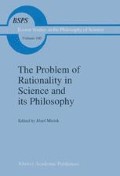Abstract
The notion of explanation has figured centrally in most contemporary accounts of scientific knowledge and rational belief. Explanation is usually cited, along with prediction, as one of the two principal functions of our factual beliefs. And the rationality of such beliefs is commonly said to be measured, at least in part, by the relative range or quality of the explanations they make possible. If something like this is correct, then it is important for us to try to understand what explanation is, and what distinguishes a good explanation from a poor one.
This paper was first presented at the Jagellonian University, Krakow, and first published as chapter 10 of P.M. Churchland (1989).
Access this chapter
Tax calculation will be finalised at checkout
Purchases are for personal use only
Preview
Unable to display preview. Download preview PDF.
References
Brody, B. A. (1972), ‘Towards an Aristotelian Theory of Scientific Explanation’, Philosophy of Science 39.
Bromberger, S. (1966), ‘Why-Questions’, in R. Colodny, ed., Mind and Cosmos (Pittsburgh: Pittsburgh University Press).
Churchland, Paul M. (1979), Scientific Realism and the Plasticity of Mind (Cambridge: Cambridge University Press).
Churchland, Paul M. (1981), ‘Eliminative Materialism and the Prepositional Attitudes’, Journal of Philosophy LXXVIII, no. 2.
Churchland, Paul M. (1985), ‘The Ontological Status of Observables: In Praise of the Superempirical Virtues’, in Churchland, P. M., and Hooker, C. A., eds., Images of Science (Chicago: University of Chicago Press).
Churchland, Paul M. (1986),’ some Reductive Strategies in Cognitive Neurobiology’, Mind 95, no. 379.
Churchland, Paul M. (1988a), ‘Folk Psychology and the Explanation of Human Behavior’, Proceedings of the Aristotelian Society: Supplementary Volume LXII.
Churchland, Paul M. (1988b),’ simplicity: The View from the Neuronal Level’, in Rescher, N., ed., Aesthetic Values in Science: Pittsburgh Colloquium in the Philosophy of Science (forthcoming).
Churchland, Paul M. (1989), ‘On the Nature of Theories: A Neurocomputational Perspective’, in W. Savage, ed., Minnesota Studies in the Philosophy of Science: Vol. 14 (Minneapolis: University of Minnesota Press).
Fodor, J. A. (1984), ‘Observation Reconsidered’, Philosophy of Science 51, no. 1.
Fodor, J. A., and Pylyshyn, Z. (1981), ‘How Direct is Visual Perception? An Examination of Gibson’s ‘Ecological Approach’’, Cognition 9, no. 2.
Friedman, M. (1974), ‘Explanation and Scientific Understanding’, Journal of Philosophy LXXI.
Gorman, R. P., and Sejnowski, T. J. (1988), ‘Learned Classification of Sonar Targets Using a Massively-Parallel Network’, IEEE Transactions: Acoustics, Speech, and Signal Processing 36, 1135–1140.
Gregory, R. (1966), Eye and Brain (London: McGraw Hill).
Gregory, R. (1970), The Intelligent Eye (New York: McGraw Hill).
Harman, G. (1965), ‘Inference to the Best Explanation’, Philosophical Review 74.
Harman, G. (1973), Thought (Princeton: Princeton University Press).
Hartshorne, C. and Weiss, P. (1935), Collected Papers of Charles Sanders Peirce (Cambridge: Harvard University Press).
Hempel, K. (1965), ‘Studies in the Logic of Explanation’, in Hempel, K., Aspects of Scientific Explanation (New York: The Free Press).
Hesse, M. (1966), Models and Analogies in Science (Notre Dame: Notre Dame University Press).
Kitcher, P. (1981), ‘Explanatory Unification’, Philosophy of Science 48, no. 4.
Kitcher, P. (1989), ‘Explanatory Unification and the Causal Structure of the World’, in Kitcher, P., ed., Scientific Explanation: Minnesota Studies in the Philosophy of Science, Vol. 13.
Kuhn, T. S. (1962), The Structure of Scientific Revolutions (Chicago: University of Chicago Press).
Lakoff, G. (1987) Women, Fire, and Dangerous Things (Chicago: University of Chicago Press).
Lehky, S. and Sejnowski, T. J. (1988a), ‘Computing Shape from Shading with a Neural Network Model’, in Schwartz, E., ed., Computational Neuroscience (Cambridge: MIT Press).
Lehky, S. and Sejnowski, T. J. (1988b), ‘Network model of shape-from-shading: neural function arises from both receptive and projective fields’, Nature 333 (June 2).
Minsky, M. (1981) ‘A Framework for Representing Knowledge’, in Haugeland, J., ed., Mind Design (Cambridge: MIT Press).
Nagel, E. (1961), The Structure of Science (New York: Harcourt, Brace & World).
Putnam, H. (1975) ‘Is Semantics Possible?’, and ‘The Meaning of ‘Meaning’’, in Putnam, H., Mind, Language and Reality (Cambridge: Cambridge University Press), 139.
Rock, I. (1983), The Logic of Perception (Cambridge: MIT Press).
Rosch, E. (1981) ‘Prototype Classification and Logical Classification: The Two Systems’, in Scholnick, E., ed., New Trends in Cognitive Representation: Challenges to Piaget’s Theory (New Jersey: Lawrence Erlbaum).
Rosenberg, C. R. and Sejnowski, T. J. (1987), ‘Parallel Networks That Learn To Pronounce English Text’, Complex Systems 1.
Rumelhart, D. E., Hinten, G. E., and Williams, R. J. (1986a), ‘Learning representations by back-propagating errors’, Nature 323.
Rumelhart, D. E., Hinten, G. E., and Williams, R. J. (1986b), ‘Learning Internal Representations by Error Propagation’, in Rumelhart, D. E., and McClelland, J. L., eds., Parallel Distributed Processing: Explorations in the Microstructure of Cognition (Cambridge: MIT Press, 1986).
Salmon, W. (1970), ‘Statistical Explanation’, R. Colodny, ed., The Nature and Function of Scientific Theories (Pittsburgh: Pittsburgh University Press).
Salmon, W. (1971), Statistical Explanation and Statistical Relevance (Pittsburgh: Pittsburgh University Press).
Salmon, W. (1978), ‘Why Ask, ‘Why’?’, Proceedings and Addresses of the American Philosophical Association 51.
Salmon, W. (1984), Scientific Explanation and the Causal Structure of the World (Princeton: Princeton University Press).
Schank R. and Abelson, R. (1977), Scripts, Plans, Goals, and Understanding (New Jersey: John Wiley and Sons).
Sturgeon, N. (1985), ‘Moral Explanation’, in Copp, D. and Zimmerman, D., eds., Morality, Reason and Truth, supplementary volume 24, The Southern Journal of Philosophy.
Teller, P. (1974), ‘On Why-Questions’, Nous VIII.
Van Fraassen, B. (1977), ‘The Pragmatics of Explanation’, American Philosophical Quarterly 14.
Van Fraassen, B. (1980), The Scientific Image (Oxford: Oxford University Press).
Wittgenstein, L. (1953), Philosophical Investigations (Oxford: Basil Blackwell), sec. 66–77.
Author information
Authors and Affiliations
Editor information
Editors and Affiliations
Rights and permissions
Copyright information
© 1995 Springer Science+Business Media Dordrecht
About this chapter
Cite this chapter
Churchland, P.M. (1995). On the Nature of Explanation: A PDP Approach. In: Misiek, J. (eds) The Problem of Rationality in Science and its Philosophy. Boston Studies in the Philosophy of Science, vol 160. Springer, Dordrecht. https://doi.org/10.1007/978-94-011-0461-6_6
Download citation
DOI: https://doi.org/10.1007/978-94-011-0461-6_6
Publisher Name: Springer, Dordrecht
Print ISBN: 978-94-010-4206-2
Online ISBN: 978-94-011-0461-6
eBook Packages: Springer Book Archive

